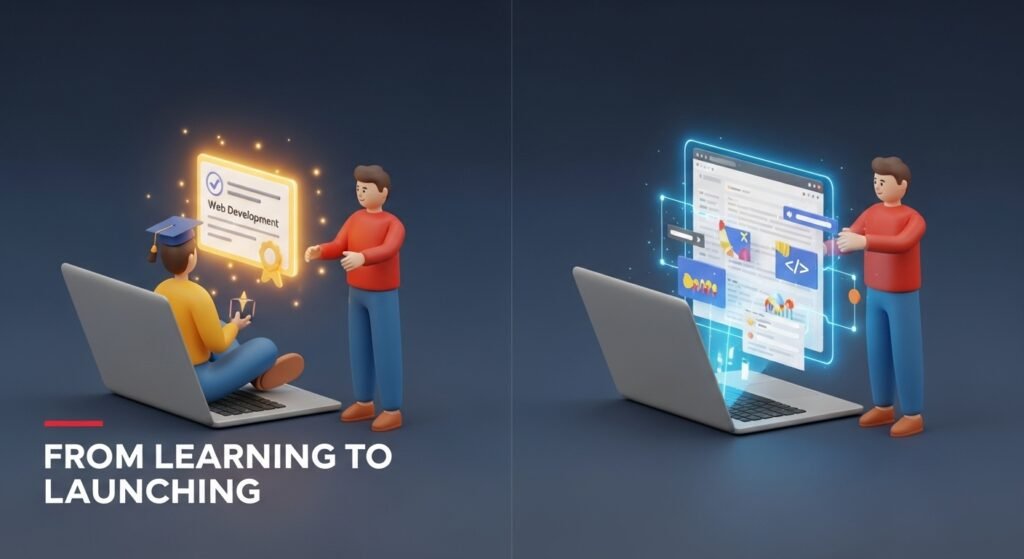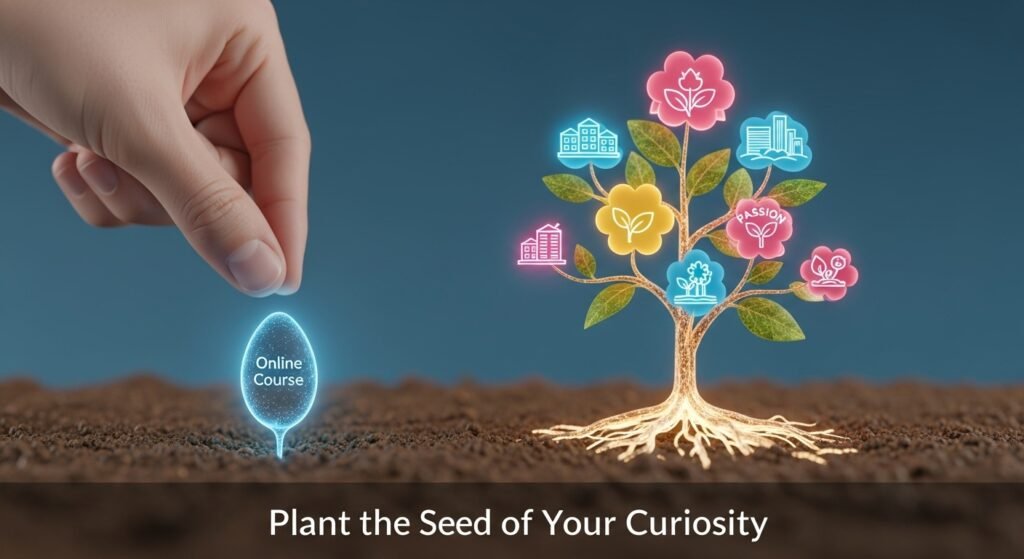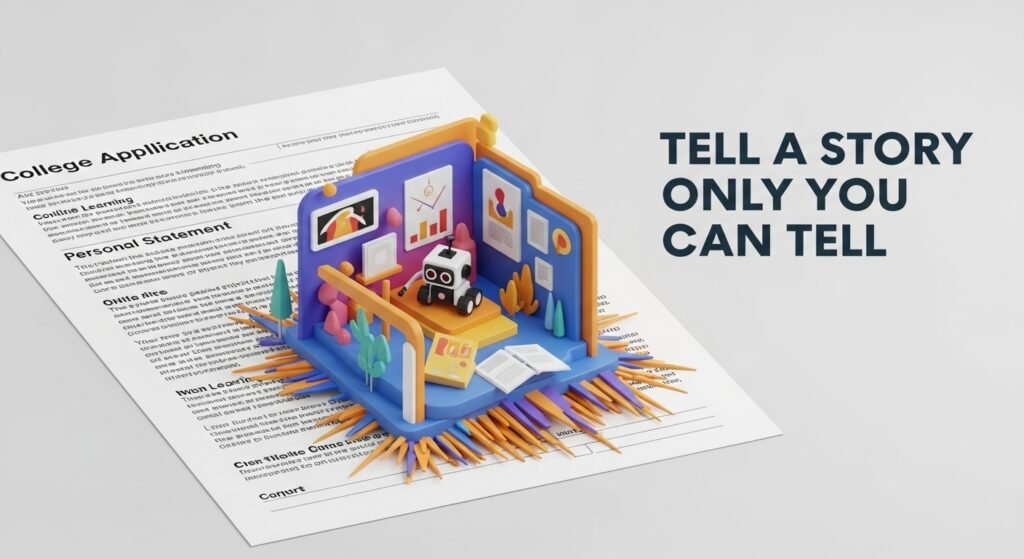The Unfair Advantage: How to Use Online Learning to Build a College Application They Can’t Ignore
It’s a feeling every college-bound high school student knows: staring at the blank boxes of the Common App, a cursor blinking mockingly in the “Activities” section. A quiet panic sets in. Am I interesting enough? Have I done enough? How do I stand out from the tens of thousands of other applicants who also have good grades and play a sport? In the hyper-competitive admissions landscape of 2025, the pressure to be perfectly well-rounded yet uniquely spiky is immense. But what if you had a secret weapon? What if there was a way to explore your deepest passions, gain real-world skills, and build a compelling narrative about yourself, all from your own laptop? That secret weapon is strategic online learning.
For today’s US high school students, online learning has evolved far beyond the emergency remote classes of the past. It’s now a powerful, flexible, and accessible ecosystem for deep intellectual exploration. When used correctly, it’s not just another line item to pad your resume; it’s the golden thread you can use to weave together your passions, experiences, and academic interests into a cohesive and unforgettable application story. This isn’t about collecting random certificates. It’s about strategically using online learning to show admission officers who you are and, more importantly, who you want to become.
The New Admissions Game: It’s All About Your Story
Let’s get one thing straight: college admissions in 2025 is not just about the numbers. With many top universities remaining test-optional and high GPAs becoming more common, admissions officers are looking for something more. They are looking for evidence of intellectual curiosity, initiative, and passion. They are looking for a story.
A traditional high school transcript tells them what you were required to do. Your strategic use of online learning tells them what you chose to do with your own time. It demonstrates that you are a self-starter, a proactive learner, and someone who takes their intellectual journey into their own hands. That’s a far more compelling story than a perfect SAT score alone.
The goal is to move beyond a scattered list of activities and build a cohesive application with a “theme” or a “spike.” This is a deep and focused interest in a particular area. Are you the aspiring astrophysicist? The future social justice lawyer? The budding video game designer? Whatever your passion, online learning is your single best tool to explore it, validate it, and showcase it to your dream schools.
The Best Free Online Data Science Courses IN 2025

The Dos and Don’ts of Online Learning for College Apps
Before you dive in, it’s crucial to understand that not all online learning is created equal in the eyes of an admissions committee. The key is to be strategic, authentic, and focused on depth over breadth.
| The “Dos” (Strategic & Impressive) | The “Don’ts” (Ineffective & Obvious) |
| DO go deep. Take a series of related courses to build a compelling narrative around your passion. | DON’T engage in “certificate stuffing”—collecting dozens of random, easy certificates. |
| DO choose courses from reputable, accredited sources like universities on edX/Coursera or established platforms. | DON’T list courses from questionable sources or platforms that lack academic rigor. |
| DO apply your skills. Use what you learned in a course to start a club, build a project, or enter a competition. | DON’T just complete the course and move on. The application of knowledge is what truly matters. |
| DO choose courses that challenge you. A verified certificate in a tough, college-level course is impressive. | DON’T just take the easiest courses you can find for a quick win. Admissions officers can tell. |
| DO be prepared to talk about what you learned in an interview or essay. Your enthusiasm should be genuine. | DON’T take a course in a subject you have no real interest in just because you think it “looks good.” |
Export to Sheets
Supercharging Every Part of Your Application with Online Learning
Let’s break down exactly how you can weave your online learning experiences into the different components of your college application for maximum impact.
Academics: Proving You’re College-Ready
Your high school transcript is the foundation of your application, but online learning can build a skyscraper on top of it.
- Fill in the Gaps: Does your school not offer AP Computer Science A? Or AP Psychology? You can take these courses online through accredited providers. This shows initiative and a desire to challenge yourself beyond your school’s curriculum.
- Demonstrate College-Level Readiness: Taking a verified course from a top university on a platform like edX or Coursera is a powerful signal. Completing a course like “Introduction to Python” from MIT or “Moral Foundations of Politics” from Yale shows an admissions officer that you can already handle the rigor of their institution.

The Activities List: More Than Just a Class
How you frame your online learning on your activities list matters. Don’t just list the course title. Frame it as a passion project.
Instead of this: “Completed ‘Introduction to Graphic Design’ on Coursera.”
Try this: “Self-Taught Graphic Design & Branding. (Grades 10, 11). 5 hrs/wk. Independently completed a 12-week university-level course on graphic design fundamentals; designed logos and promotional materials for 3 school clubs, increasing event attendance by an average of 20%.”
The second version shows not just learning, but application and impact. That’s the gold standard.
The College Essay: The Origin Story of Your Passion
Your personal statement is your chance to tell your story, and an online course can be the perfect catalyst for that story. An essay about how a random YouTube tutorial on coding sparked a passion that led you to take a formal online course, build an app, and decide to major in computer science is incredibly compelling. It’s a narrative of discovery, initiative, and intellectual excitement—exactly what colleges want to see.
Test Prep: A Smarter Way to Study
This is one of the most common and effective uses of online learning. Instead of (or in addition to) expensive private tutoring, you can use platforms like Khan Academy—the official partner of the College Board—for personalized SAT prep. These platforms use diagnostic tests to identify your specific weaknesses and provide targeted practice, making your study time far more efficient.
The Best Free Online Data Science Courses IN 2025

A Personal Story: How a “Random” Course Became an Application’s Centerpiece
Let me tell you about a student, we’ll call her Maya. Maya was a strong student but felt her application lacked a clear focus. She was interested in environmental issues but wasn’t sure how to show it beyond being in the school’s environmental club.
On a whim, she took a free online course about the science of soil. It sounds niche, but she was captivated. It connected biology, chemistry, and agriculture in a way she’d never considered. This one course sparked a fire. She then took another, more advanced course on sustainable agriculture.
Inspired, she used what she learned to propose and lead a project to build a composting system for her school’s cafeteria, diverting hundreds of pounds of food waste from the landfill.
When it came time to apply to college, her story was clear and powerful. Her personal statement was about the surprising beauty of soil and how it taught her that the biggest solutions often start from the ground up. The online learning courses weren’t just two lines on her activities list; they were the origin story of her intellectual and personal journey. That’s the kind of authentic narrative that gets an admissions officer to say, “We need this student on our campus.”
Best Remote Internship Programs in 2025
How to Choose: Not All Online Learning is Created Equal
With thousands of courses available, it can be overwhelming to choose. Here’s a quick guide to vetting your options:
- Check the Source: Is the course offered by an accredited university, a reputable company (like Google or IBM), or a well-known educational institution? The provider matters.
- Look for Rigor: Does the course have graded assignments, challenging projects, and opportunities for feedback? A course that you can complete passively in a few hours is less impressive than one that requires weeks of dedicated effort.
- Consider the Certificate: A verified certificate from a major platform like edX or Coursera, especially for a course from a top university, holds significant weight. It proves you completed and passed the course.
- Read Reviews: See what other students have said about the course content and the instructor.

Conclusion: Build a Bridge to Your Future
In the competitive world of college admissions, your application is your story. The grades and scores are the foundation, but your passions and intellectual curiosity are what build the structure. Strategic online learning is the most powerful tool you have to build a bridge between the student you are today and the scholar you want to be.
Don’t just collect certificates. Follow your curiosity. Go deep. Use your new skills to create something, to help someone, or to change something. Show colleges not just what you’ve learned, but what you do with what you learn. That is the story they will never forget.
What is one passion you have that you could explore more deeply with an online course? Share your idea in the comments—you might just inspire someone else!



